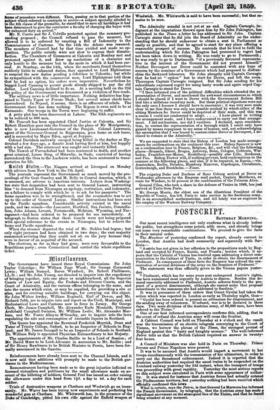31iortlInurnus.
The Government have issued three Royal Commissions. Sir John Taylor Coleridge ; Sir William Page Wood ; Sir George Cornewall Lewis ; William Samuel, Baron Wynford; Dr. Robert Phillimore, LL.D. ; and Mr. John Young, are directed to inquire into the expediency of bringing together, into one place or neighbourhood, all the Superior Courts of Law and Equity, the Probate and Divorce Courts, and the Court of Admiralty, and the various offices belonging to the same, and into the means which exist, or may be supplied, for providing a site or Sites, and for erecting suitable buildings, for carrying out this object. Sir John Wither Awdry, William Reginald, Earl of Devon, and Mr. Richard Jebb, are to inquire into and report on the Civil, Municipal, and Ecclesiastical Laws and Customs now in force in Jersey. Sir George Clerk, Mr. James Campbell, Mr. Alexander Earle Monteith, Professor Archibald Campbell Swinton, Mr. William Leslie, Mr. Alexander Mac- lean, and Mr. Foster Alleyne M`Geachy, are to inquire into the laws regulating the sale and consumption of excisable liquors in Scotland.
The Queen has appointed the Reverend Frederick Meyrick, Dean and Tutor of Trinity College, Oxford, to be an Inspector of Schools in Eng- land; and Mr. James Scougall to be an Inspector of Schools in Scotland. Dr. William Baly is appointed Physician Extraordinary to her Majesty.
The appointments of Mr. Charles Baillie to be a Lord of Session ; of Mr. David Mure to be Lord-Advocate in succession to Mr. Baillie ; and of Sir Henry Rawlinson to be British Minister in Persia, have been for- mally announced in the Gazette.
Reinforcements have already been sent to the Channel Islands, and it is now said that additions will promptly be made to the British gar- risons in the Mediterranean.
Remonstrances having been made as to the great injustice inflicted on licensed victuallers and publicans by the small allowance made on ac- count of the billeting of soldiers, General Peel has issued an order raising the allowance under this head from lid. a day to 4d. a day for each soldier.
Trials of destructive weapons at Chatham and Woolwich go on inces- santly. Mr. Warry has been trying new experiments and perfecting his wonderful gun at Chatham. Mr. Whitworth has, in the presence of the Duke of Cambridge, pitted his own rifle against the Enfield weapon at Woolwich. Mr. Whitworth is said to have been successful; but that re- mains to be seen.
The Admiralty scandal is not yet at an end. Captain Carnegie, in- dignant at the imputations thrown upon him by Sir John Pakington, has published in the Times a letter he has addressed to Sir John. Captain Carnegie states that he did join the Board of Admiralty on the under- standing that he should endeavour to obtain a seat in Parliament as easily as possible, and that he agreed to start for any place offering a reasonable prospect of success. He contends that he tried to fulfil the understanding which Sir John Pakington had presumed to regret had not been taken down in writing. He was ready to go to Portsmouth ; he was ready to go to Dartmouth "if a previously favoured representa- tive in the interest of the Government did not present himself."' Neither Devonport nor Dover could be contested with any hope of success by the nominee of a Government which had proposed to disfran- chise the dockyard labourers. Sir John abruptly told Captain Carnegie that he had no " option" but to start for Dover, and left the room. Thereupon Captain Carnegie resigned. But Sir John sending for his subordinate expressed regret for using hasty words and again urged Cap-. tain Carnegie to stand for Dover. "I then informed you of the political difficulties which attended the re- presentation of Dover, and mentioned the awkward circumstances in which I should be placed if I went to Dover with the Government Reform Bill tied like a millstone round my neck. But these political objections were not the only ones I foresaw I should have to encounter ; it was very soon made clear to me that there was only one possible method by which either of the sitting Members for Dover could be deprived of their seats, and this was
a course I could not condescend to adopt I have placed in writing the arrangement made, and I have endeavoured to carry out that arrange- ment. I did not hesitate, nor did I vacillate. I declined, upon considera- tion, to contest the representation of a borough which I could only have gained by means repugnant to my sense of honour, and, not acknowledging the assumption that I was bound to contest either Dover or Devonport, I de- clined to remain at the Admiralty."
We are requested to state that the Bishop of London has made arrange- ments for confirmations on the continent this year. Bishop Spencer is now on a confirmation tour in France, Belgium, &c., and will visit the following places—Brussels, Ghent, Bruges, Antwerp, Bonn, Cologne, Coblentz, Wis- baden, Frankfort-sur-Maine, Heidelberg—possibly also Lille, Bordeaux, and Pau. Bishop Trower will, if nothing prevent, hold confirmations in the summer at the following places, and also, if it be required, in Russia,—viz. Amsterdam, Berlin, Dresden, Hamburg Hanover, Copehagen, Christiania, Gottenburgh, and Stockholm.—Times.
The reigning Duke and Duchess of Saxe Coburg arrived at Dover on' Wednesday afternoon by the Empress mail packet, Captain Matthews, en route for Windsor, to be present at the confirmation of the Princess Alice.
General 17lloa, who took a share in the defence of Venice in 1849, has just arrived at Turin from Paris.
Mr. George Manias, the eldest son of the illustrious President of the Republic of Venice, has left Paris to take service in the Sardinian army. He is an accomplished mathematician, and till lately was an engineer in the employ of the Western Railway Company.


























 Previous page
Previous page